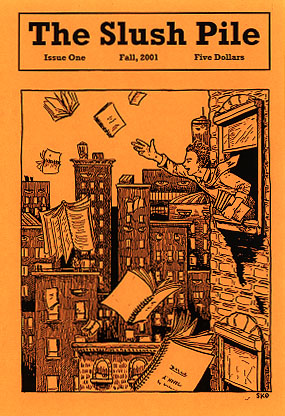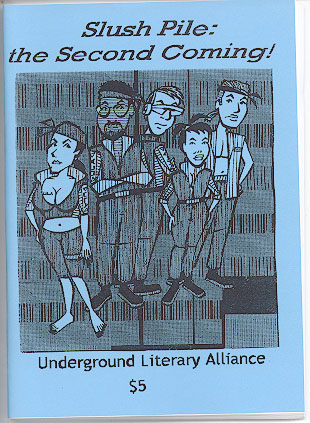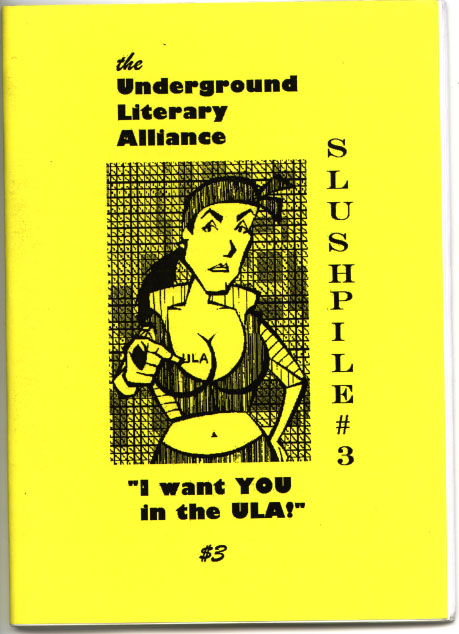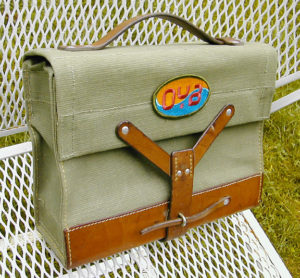The Greatness of Zining
One of the greatest things about zining is that there are no strings attached.
Which is one of my big complaints about any official help for anyone or
any group membership which results in help: there are always strings
attached. The first thing departing being truth, self-respect the next.
With strings, you cannot say the emporer has no clothes, nor do you bite the
hand that feeds, the real war doesn’t get in the book, and there is a
multifaceted taint (you’re given something so you and everyone
who meets you wonders what if…also being given something means
someone else was explicitly NOT given it…gifts are a HUGE form of control).
Someone who purposely refuses all GIVEN ties will find themselves alone.
With only real friends.
They can then publish a zine! : )
*******
Another great thing about zining is that it is perhaps most
effective custodian of the personal journal literary form today.
Anything to do with autobiography (the autobio novel/poem…)
Sure, some journals get published, but it’s probably not a very highly
developed or pursued literary form. However, it’s one with a lot of merit
& potential. It just gets no funding is all.
And I find that to be interesting also: probably the
main reason why it wouldn’t be pursued is that by definition it
can’t get any grants, funding or prizes: because the author is
mentioned by name this form is excluded from applying. Even though
judges know who applicants are already (often students, friends,
obvious brand name styles, etc.) you can’t name names, I guess.
Also most lit is auto-bio anyway. Writers draw from life–mainly their own.
And as with other $-resources of this type, it’s just the tip of the
iceberg: you can’t get into a good faculty without grants/funding/prizes;
can’t get into NY publishing without academic credentials. It’s a chain.
Heck, there’s even a Hollywood dovetail now. NY really won’t push a
book that can’t be sold as a movie. (So the sell-out rule for Hwood
is now about the same for NY.) Exceptions prove the rule or the trend at least.
Then there’s the new writer mode in our culture: writer as celebrity.
As Michener said: you can make a fortune but not a living as writer.
Sure it’s best if it can be made a movie, but then there’s critical work.
In that case, it needs to be able to be chatted up on TV. It’s bad
if it won’t fit TV (or NPR) (or any party line). Readings and lectures need to
figure in. A writer is helped today if they’re good in this light. This DILUTES
the necessity that they write good per se. Hollows it out. A real writer
needs/wants to be left alone to WRITE. This gives the
zine a big advantage! Not to be invisible. But to take over.
To build reading back up, transform it, revive it. To broaden it
into a market again, instead of a bland monolith. Oprah’s Book Club
doesn’t build reading. She’s post-literate. It’ll become even more
dilute. Weaken, become vulnerable. —To thought control on the one
hand, zining on the other. There’s David and Goliath for ya!
Locked in carnal embrace for the soul of the culture. (JS tm)
Our odds are no worse than Steve Jobs were. We’re the pinworm
in the brain of the monster. (cf) Unless we shirk our duty.
It’s kinda neat thinking that if an advance happens in the classic
genre of personal journal or autobio or even plain old quality
there’s a decent chance it’ll come from zining.
(Autobio as a form per se…if it’s from an established writer then it’s memoir.)
Maybe it’s why so many well-read people were so struck by
zines like Pathetic Life. It was a breath of fresh air in a neglected
classic form.
******
The flip side to the real mainstream is the false one and its values…
The St. Martin’s book on George Bush Recall Scandal
…What a hilarious highlight of what is wrong in publishing today
as shown in Their System working perfectly.
The TV anchor asked some experts: Didn’t they have it thoroughly
tested and vetted the way all books are screened today?
Oh, yes, they all answered.
(One of the experts really was labeled under his talking head image that he
was a ‘lawyer who VETS books’. The term ‘vetting’ was used frequently,
just as if everyday publishing was the same as wartime and classified
info.)
This latest hilarity, a pack of lies written by a criminal “just slipped
thru,” they say. They don’t say that this is what the system produces when
it works perfectly. Everyone did their best to both *cover their asses* and
*get ahead*. Nowhere was anyone the slightest bit interested in integrity
or quality. The George Bush book is the inevitable result. The Dennis Rodman
book, the Madonna book…all of them…the same.
A book today goes thru the following gutter-snipe process: Will it get
us into trouble; is it defensible? (NOT ‘Is it wrong or bad?’) Will it make us
a bundle of easy money? (NOT ‘Is it worth doing? Do we need it?’) If either
answer is wrong by The System, it won’t be touched with a 10footpole.
It goes thru legal and marketing to determine what the publisher thinks
about it. It doesn’t go thru the publisher’s conscience anymore. In fact,
it probably doesn’t have to go thru L and M anymore: everyone involved
has trained themselves like seals to smell only fishy money. (Not even
mainstream money, but fishy money: money coming the way they want it.
Recognition coming from who they care about. Not the masses. But just
their immediate boss, or just some incidentally influential critic—boyfriend
of their boss?)
That’s why no book that a committee can’t love, no book against committees,
will be published. Nothing original allowed. Nothing risky.
What if the artist was actually allowed to be an artist? —The crazy thing is
that whenever THAT is actually allowed to happen the result is a runaway
success. It’s just that The System rarely lets that happen. The real artist
getting thru NOW THAT’S THE ACCIDENT!





